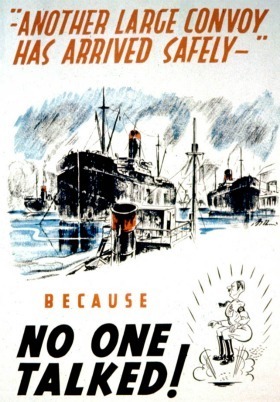Why I don't tell people anymore that I am in the military: I'm sick of 'the questions'

By Crispin Burke
Best Defense department of civil-military affairs
For my first few years in the military, I used to tell
strangers the complete truth about my chosen profession. But after a few
discomfiting conversations, I decided to hide my military service from
strangers. When asked what I do for a living, I sometimes claim that I'm
unemployed, or even that I'm a reporter. There are times I'll claim to be
an accountant. Admittedly, the ruse is difficult to keep up at times. Not many
accountants can console fellow air travelers during a foul-weather approach
into the Syracuse airport by noting that the ILS Runway 10 approach can bring
an aircraft down to two hundred feet above ground level before the pilot can
proceed visually.
It's
a little white lie, sure, but it staves off a lot of awkward situations. In
fact, I wish I'd used it more often.
While
veterans generally appreciate not being treated as poorly as their Vietnam-era
predecessors, today's hero-worship can make many service members uneasy. Without a personal connection
to the military, many Americans base their perceptions of military service a
stoic figure in a recruiting commercial, or a valiant hero in a Hollywood
movie. But no service member could ever measure up to a Hollywood concoction. We're
all just as fallible as anyone else. Even the greatest heroes -- Salvatore
Giunta, Leroy Petry, and Dakota Meyer -- have accepted our nation's highest
honor with candor and humility.
And
while a kind word or a smile is certainly welcome, the lavish praise and
generosity heaped on to service members may be breeding an unwarranted side
effect among younger vets: self-righteous entitlement.
Still
another segment of the public looks upon service members as hapless victims,
and unfortunately for many, this
is all too true. But some erroneously believe that all veterans invariably
suffer from Post-Traumatic Stress Disorder; while others presume that we've all
been subjected to years' worth of brainwashing. To some, a young man or woman
shipping off to Basic Training might as well be going to the Gulag. I once
visited my old high school and revealed that I had just been commissioned as a
lieutenant in the Army. One woman gasped, covering her mouth, "How much
longer do you have left?" Responding, "As long as I like," probably
did little to ease her mind. (And, in truth, my blog will probably
get me fired long before that.)
The
fact of the matter is that I've become a better person for my service in the
military. And even though the job is not without its bouts
of frustration, it still has its enjoyable moments. Plus, it pays the
bills. How many people can do that these days? [[BREAK]]
Perhaps
most important of all, many Vets keep quiet about their service to avoid...the
questions.
"My
friend's cousin Steve is in the Army or the Navy or something like that. Do you
know him?" (Sorry, missed the FRAGO that
designated one day as "Everyone in the Armed Forces gets together and introduces
themselves day.")
"Is
war really like Call of Duty: Modern Warfare 3?" (Never played COD:MW3. But
rest assured, this video game is about as hard-hitting and realistic as
it gets.)
"There
are girls in the Army? When did they start letting girls in the Army?" (You'd
be surprised at how often this one comes up.)
"What's
Iraq like?" (Do you want metrics? I seem to have forgotten my Excel
spreadsheets and PowerPoint slides.)
Which
brings me to my point, so eloquently spoken by one of my fellow bloggers, "What do you vets want"? Try this on for size: Most vets
simply want to be treated like human beings. In other words, stop confusing the
individual with the institution.
Strangers
may think nothing of dumping their ill-conceived sentiments regarding foreign
affairs on the nearest service member. But that veteran sitting next to you on
the plane is just as responsible for foreign policy as the average AIG employee
is for the financial meltdown, or a doctor is for ballooning medical costs.
You
see, most service members would rather not talk about work during their
off-time. But this has little to do with the horrors of war. After working
twelve to fourteen hour days, often without weekends, the last thing any
service member will want to talk about is, well, more work. I realize that
the institution is fascinating because, for many, it's a mystery. But there are
times I wish I could just hide that portion and force strangers to look at me
as a regular person.
We
may wear the same uniforms, but we're an organization of 2.3 million
individuals. Some are parents, some aren't. Some like baseball, others
football, others may not care much for sports at all. Some re-enact Civil War
battles, some play World of Warcraft. In an organization 2.3 million strong,
you might even find the occasional brony.
What
do we want?
We
neither want to be looked up to nor down upon. More often than not, we just
want our fellow Americans to look past the uniform and see the person inside
of us.
Don't
tell anyone, but Maj. Crispin J. Burke is a U.S. Army officer who has served in
Iraq (which is hot), Fort Bragg, Honduras, Fort Drum (which is not), and
Germany (which is foggy and used to invade its neighbors on rainy Thursdays).
He is a contributor to Small Wars Journal, and flies his own blog, Wings Over Iraq. Insert
standard disclaimer here about not reflecting anyone's opinions.
Thomas E. Ricks's Blog
- Thomas E. Ricks's profile
- 436 followers



